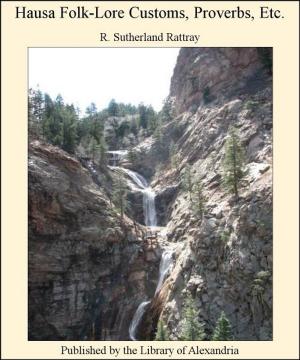Crocker's Hole From Slain By The Doones
Nonfiction, Religion & Spirituality, New Age, History, Fiction & Literature| Author: | Sir Richard Blackmore | ISBN: | 9781465556943 |
| Publisher: | Library of Alexandria | Publication: | March 8, 2015 |
| Imprint: | Language: | English |
| Author: | Sir Richard Blackmore |
| ISBN: | 9781465556943 |
| Publisher: | Library of Alexandria |
| Publication: | March 8, 2015 |
| Imprint: | |
| Language: | English |
The Culm, which rises in Somersetshire, and hastening into a fairer land (as the border waters wisely do) falls into the Exe near Killerton, formerly was a lovely trout stream, such as perverts the Devonshire angler from due respect toward Father Thames and the other canals round London. In the Devonshire valleys it is sweet to see how soon a spring becomes a rill, and a rill runs on into a rivulet, and a rivulet swells into a brook; and before one has time to say, "What are you at?"—before the first tree it ever spoke to is a dummy, or the first hill it ever ran down has turned blue, here we have all the airs and graces, demands and assertions of a full-grown river. But what is the test of a river? Who shall say? "The power to drown a man," replies the river darkly. But rudeness is not argument. Rather shall we say that the power to work a good undershot wheel, without being dammed up all night in a pond, and leaving a tidy back-stream to spare at the bottom of the orchard, is a fair certificate of riverhood. If so, many Devonshire streams attain that rank within five miles of their spring; aye, and rapidly add to it. At every turn they gather aid, from ash-clad dingle and aldered meadow, mossy rock and ferny wall, hedge-trough roofed with bramble netting, where the baby water lurks, and lanes that coming down to ford bring suicidal tribute. Arrogant, all-engrossing river, now it has claimed a great valley of its own; and whatever falls within the hill scoop, sooner or later belongs to itself. Even the crystal "shutt" that crosses the farmyard by the woodrick, and glides down an aqueduct of last year's bark for Mary to fill the kettle from; and even the tricklets that have no organs for telling or knowing their business, but only get into unwary oozings in and among the water-grass, and there make moss and forget themselves among it—one and all, they come to the same thing at last, and that is the river.
The Culm, which rises in Somersetshire, and hastening into a fairer land (as the border waters wisely do) falls into the Exe near Killerton, formerly was a lovely trout stream, such as perverts the Devonshire angler from due respect toward Father Thames and the other canals round London. In the Devonshire valleys it is sweet to see how soon a spring becomes a rill, and a rill runs on into a rivulet, and a rivulet swells into a brook; and before one has time to say, "What are you at?"—before the first tree it ever spoke to is a dummy, or the first hill it ever ran down has turned blue, here we have all the airs and graces, demands and assertions of a full-grown river. But what is the test of a river? Who shall say? "The power to drown a man," replies the river darkly. But rudeness is not argument. Rather shall we say that the power to work a good undershot wheel, without being dammed up all night in a pond, and leaving a tidy back-stream to spare at the bottom of the orchard, is a fair certificate of riverhood. If so, many Devonshire streams attain that rank within five miles of their spring; aye, and rapidly add to it. At every turn they gather aid, from ash-clad dingle and aldered meadow, mossy rock and ferny wall, hedge-trough roofed with bramble netting, where the baby water lurks, and lanes that coming down to ford bring suicidal tribute. Arrogant, all-engrossing river, now it has claimed a great valley of its own; and whatever falls within the hill scoop, sooner or later belongs to itself. Even the crystal "shutt" that crosses the farmyard by the woodrick, and glides down an aqueduct of last year's bark for Mary to fill the kettle from; and even the tricklets that have no organs for telling or knowing their business, but only get into unwary oozings in and among the water-grass, and there make moss and forget themselves among it—one and all, they come to the same thing at last, and that is the river.















